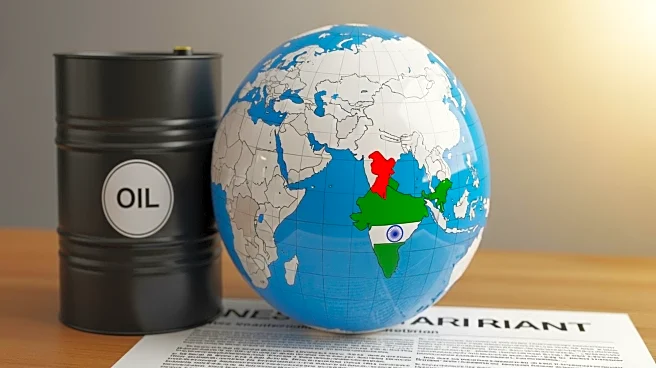What's Happening?
President Trump has asserted that Indian Prime Minister Narendra Modi privately agreed to cease purchasing Russian oil within a short period. This claim follows the imposition of 50% tariffs on Indian goods by the U.S., which were framed as a penalty
for India's continued import of Russian crude. Despite Trump's statement, Indian officials have distanced themselves from these comments, with a government spokesperson indicating no awareness of such a conversation between Modi and Trump. Russia's envoy in Delhi, Denis Alipov, emphasized the benefits of Russian oil for India's economy, highlighting the complex dynamics of India's energy policy, which balances historical ties with Moscow and increasing pressure from Washington.
Why It's Important?
The situation underscores the geopolitical complexities faced by India as it navigates its energy needs amidst international pressures. India's reliance on Russian oil, which accounted for 37% of its oil bill last year, is significant for its economy. The tariffs imposed by the U.S. could strain economic relations between the two countries, potentially impacting trade and diplomatic ties. The broader implications involve the strategic balancing act India must perform between maintaining its energy security and responding to international diplomatic pressures, particularly from the U.S., which seeks to limit Russian economic influence.
What's Next?
India may need to reassess its energy import strategy if the U.S. continues to exert pressure through tariffs and diplomatic channels. Potential shifts in India's oil import policy could affect global oil markets, especially if India reduces its reliance on Russian crude. The situation may also prompt further diplomatic engagements between India, the U.S., and Russia, as each country seeks to protect its interests. Observers will be watching for any official statements or policy changes from India in response to Trump's claims and the ongoing tariff situation.
Beyond the Headlines
The controversy highlights the ethical and strategic dilemmas faced by countries in balancing economic interests with geopolitical alliances. India's decision-making process in this context may reflect broader trends in international relations, where economic dependencies are increasingly intertwined with political strategies. The long-term impact on India's foreign policy and its role in global energy markets could be significant, potentially influencing how other nations approach similar challenges.















